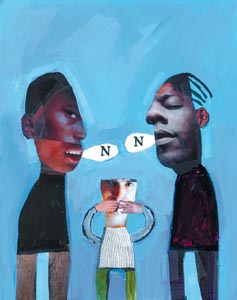A view from NCAT

By Danya R. Bacchus
North Carolina
Agricultural and Technical State University
Links for Study

By Danya R. Bacchus
North Carolina
Agricultural and Technical State University
Links for Study
In San Jose, California a white student was angry that his Black teacher had his friend suspended from school. In anger the spray painted a school wall with the teacher's name and the N word, which was spelled N-I-G-G-A and not N-I-G-G-E-R.
Of course, offended by this message the Black teacher decided to take the matter to court. In court though it was proven that because the white student spelled the N-word with an "a," instead of an "er,", his comment was not racial. After reading this article, I was left pondering the question of: When is the N-word a racial term?
In the African-American community the N-word is used frequently and freely. It has become commonplace for two Black people to greet each other by saying, "What's up Nigga?"
This greeting is not taken offensively nor as a racially derogatory comment. In fact, to some it is thought of as a term of endearment. Although the origin of the word Nigger has an ugly past, it seems as though African Americans have taken the word and changed its connotation.
The word Nigger dates back to the late 16th century. The obsolete spelling niger dates to 1574. It derives from the Latin niger meaning black.
The offensiveness of the word has increased over time, especially in the 20th century. In the 20th century of course, the word had become extremely offensive, but is acceptable in Black English when African Americans use it to refer to each other.
Some believe that by African-Americans using the n-word to refer to themselves, they rob the term of its offensiveness. During an interview with CSPAN, Toni Morrison commented about the use of the N-word amongst African Americans. "I think it's a bit more complicated than self-contempt. Every group has a contemptuous word for itself. Its a kind of survivalist strategy,"Morrison said. The N-word has power. Well, at least it did have power until the people that it was meant to degrade started using the word amongst themselves.
The N word is used in everyday conversation, movies and especially music. The use of the N word has become a phenomenon that has taken over hip-hop culture. The word isn't taken offensively though, until someone of another ethnic group uses the word. Even when a music artist of another ethnic group uses the word there are exceptions. For instance, Jennifer Lopez, a Puerto Rican singer was ridiculed for using the N word in one of her songs. On the other hand, Puerto Rican rappers Big Pun and Fat Joe have used the word and its not even thought twice about.
This controversial issue has raised many eyebrows and crossed those lines that are to never be crossed. At A&T the word doesn't seem to be that much of a problem. It is used frequently and freely among African American students. At any given time during the day, you can hear someone say the N word and most students will keep going about their day. I decided to ask A&T students and professors about the word and surprisingly, the viewpoints were different.
Brooke Harrell, a junior public relations major, feels, "The word itself has an extremely negative connotation, but in the African American community its more a term of endearment."
Jody Martin, a professor of English, said "I despise the word and I cannot stand to hear people use it, whether you're White, Black, Indian or Asian. The word is negative; you might as well call someone Jiggaboo, Darkie or Boy. As long as African Americans use the word we are allowing other ethnic groups to use the word as well."
Byron Turman, a professor of English, felt okay with the use of the word, "There are many words among ethnic groups that are just used within that ethnic group. As long as the racial lines aren't crossed then it's okay."
The bottom line is white people cannot rightly say about blacks some of the things blacks say about themselves, and vice versa. That may e a double standard, but its not one that violates the basic commonsense principle that context is everything. It's a double standard by which we all abide.
******************************
For more information on this subject check out these links:
Charles Taylor in Salon.com, January 22. 2001 on Prof. Randall Kennedy's January 2002 book, Nigger: The Strange Career of a Troublesome Word.
Harvard Law Bulletin on Randall Kennedy's publication Race, Crime, and the Law, (1997)
USA Today on the Feb 25, 2001 use of Randall Kennedy's Nigger: The Strange Career of a Troublesome Word in the TV inner-city drama Boston Public.
The Cincinnati Enquirer, Sunday, August 05, 2001, on how "evolving N-word uses" divide the races and the generations.
Prof. Randall Kennedy
An interview with the author
Nigger: The Strange Career of a Troublesome Word.
NCAT Journalism Magazine
Copyright ©2002 Danya R. Bacchus
All Rights Reserved
Citation Permitted Only With Credit